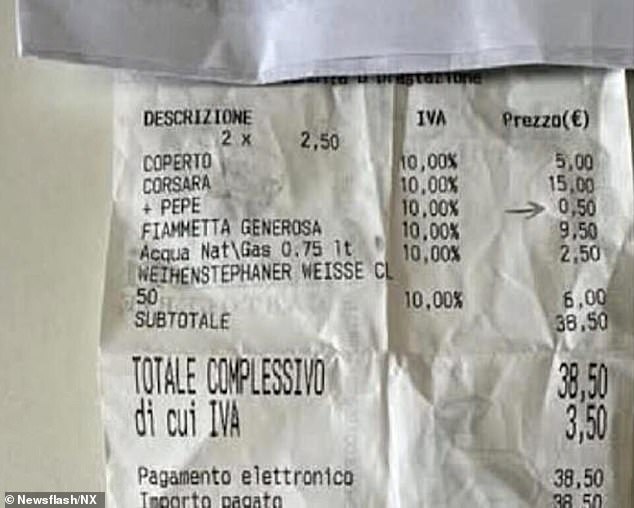A diner who asked for a sprinkle of black pepper on his pizza in an Italian tourist hotspot was shocked to find he had been charged extra for it and later sparked outrage online by posting a photo of the receipt.
The customer, who is believed to be a local resident of Bari, Italy, had been dining at a city centre pizzeria where he ordered two pizzas, a bottle of water, a beer, and paid a standard cover charge.
But among the listed items was a surcharge of 50 cents (42p) marked as ‘+pepper’.
After the diner shared the incident online on August 7, he prompted a backlash over what many labelled a ‘crazy’ summer receipt.
A photo of the bill shows a total of 38.50 euros (£33), including the 50 cents added solely for the pepper.
While some defended the extra charge as fair for an added ingredient, many others criticised the practice, citing growing frustration at price increases during the holiday season in tourist hotspots.
The controversy comes weeks after a fancy coffee shop in Oderzo, in northern Italy, charged a customer for cutting her croissant in half.
The furious woman, who was not named, had bought two coffees and a pastry for breakfast to share with her mum at the Audrey Patisserie on July 27.

A customer was charged 50 cents for adding a sprinkling of black pepper to a pizza in Bari, Italy

Bari, the capital of southern Italy’s Puglia region, is a popular tourist hotspot

The customer ordered two pizzas, a bottle of water, a beer, and paid a standard cover charge including 50 cents for black pepper
She only noticed the extra 10 cents charge for asking staff to split the croissant in half when she got home and looked at the bill.
Within hours the post spread like wildfire triggering an avalanche of criticism from social media users.
One user called ‘gimmy’ wrote: ‘You have to hate your customers to charge them 10 cents to cut a croissant in half. A total lack of elegance, refinement, and empathy.
‘They should bring hotel management students to your restaurant to show them how not to treat your customers. Pathetic.’
And ‘Folletto Vola’ said: ’10 cents what a disgrace… just to cut a croissant!!!’
Owner Massimiliano Viotto claimed that the extra money was to cover the use of an extra plate and napkin and for the ‘skill’ needed to cut a pastry in half.
He said: ‘It’s not a scam. It is a conscious choice that we defend with pride.’
A British tourist was left furious in April after being charged extra for two ice cubes at a Costan del Sol beach bar.

A fancy coffee shop in Oderzo, in northern Italy, charged a customer for cutting her croissant in half

Audrey’s Bakery in Oderzo, Italy, charged a customer for cutting a croissant in half

The customer only noticed the extra 10 cents charge for asking staff to split the croissant in half when she got home and looked at the bill

The incident triggered an avalanche of criticism from social media users who were surprised at the surcharge
Brit Viv Proops, who visited the Havana beach bar in Estepona, took to social media to rant about the extra cost.
‘On Playa del Cristo beach today. Ordered an ice coffee at Havana Beach Bar and was charged for a coffee and charged extra for two ice cubes. Is that normal?’, the Brit wrote.
The traveller said she was charged 4.50 euros for a coffee, and an additional 50 cents for the ice cubes.
Social media users were quick to come to the tourist’s defence, saying the extra charge was ‘not normal’ and branding the beach bar as a ‘rip off’.
‘That’s ridiculous. I would not go back there,’ one user wrote.
Another said: ‘People need to stop going to these places. Everyone is getting ripped off.’
But the Havana Beach Bar told English speaking newspaper Spanish Eye that the reason for the extra charge was due to the costs of running an ice machine.
‘We use a professional industrial ice machine that cost us over 9,800 euros, and it consumes a significant amount of electricity daily,’ a spokesperson for the bar said.
‘We understand it might seem minor, but in our setting where everything is brought close to the sea with comfort in mind, small extras help cover the high operational costs.’
This article was originally published by a www.dailymail.co.uk . Read the Original article here. .

